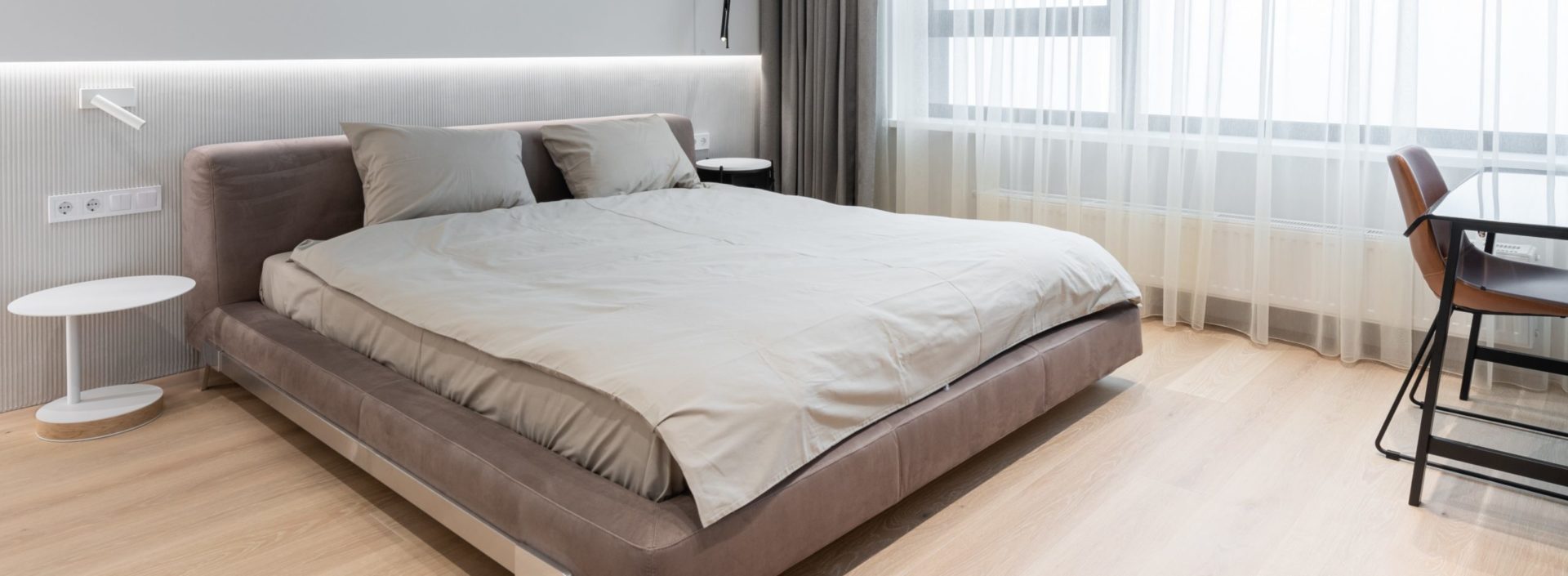Cotton Vs Linen Sheets: Which Is Best For You?
From adding aesthetic appeal to your bedroom to helping you sleep like a baby, your bedding has many roles to play. It is also one of the few materials you’re in direct contact with for one-third of your day.
So it’s obvious that a lot rides on choosing the perfect sheet for your bed.
Now, if you’re all for healthy and natural fabrics, you might have narrowed down your search to linen vs cotton sheets.
And for good reason. Both are comfortable, breathable, and hold a certain degree of aesthetic appeal. But which one fits your peculiar needs better?
Whether your needs are purely aesthetic, health-related, or basic, here are all the reasons to consider when deciding between cotton vs linen sheets.
What Are Linen Sheets?
Linen sheets are a type of bedding made using linen, an all-natural fabric. Linen is made from the stalks of the flax plant.
Linen sheets have a looser weave than other fabrics. They also have a low thread count of between 80 and 150 due to the long and thick fibers of the flax.
Linen sheets are best known for their durability and porousness. They can also be quite expensive.
Let’s check out some types of linens used to make sheets.
Types Of Linen
If you want the best linen in terms of quality, go for the French flax variety. It is grown in France, which provides the most-favorable climate conditions for growing linen of superior quality.
Belgian linen is a close second, it’s also in the same price range and offers more or less the same features.
The only thing to remember is to buy 100% Belgian or French flax linen sheets.
Pros And Cons Of Linen Sheets
Pros
- Smooth and comfortable feel
- Durable
- Eco-friendly
- Naturally cooling
- Moisture wicking
- Get softer with every wash
- Hypoallergenic
- Casual look
Cons
- Fewer color options
- Feel coarse at first
- Very expensive
- Wrinkles very easily

What Are Cotton Sheets?
Cotton sheets are sheets made from cotton fabric. It is a natural fabric made from the fibers of cotton plants.
The best cotton sheets have a thread count of between 200 and 400.
A variety of cotton can be used to make cotton sheets.
Let’s take a look at the different types of cotton and their key features.
Types of Cotton
Egyptian cotton is the most popular and luxurious of all the different types of cotton. It is super light, cool, soft, and highly durable. Sheets made of Egyptian cotton are the most expensive variety of cotton.
Pima cotton is a mid-range option with moderate breathability, absorbency, and durability.
The most affordable type is upland cotton, but it is also less soft and least durable among other cotton types.
Pros And Cons Of Cotton Sheets
Pros
- Soft and inviting feel
- Durable
- Wide variety of color and pattern options
- Different types of weaves
- Naturally hypoallergenic
- Budget-friendly
- Easy maintenance
Cons
- Moderate durability
- Moderate cooling
- Shrinkage
Similarity Between Linen And Cotton Sheets
Before we delve further into the linen sheets vs cotton sheets debate, here’s a brief look at the similarities between both fabrics.
- They are natural and eco-friendly
- They are cooling and moisture-wicking
- They are durable
- They are low-maintenance
- They are hypoallergenic

Differences Between Linen And Cotton Sheets
Durability
Linen is a more durable fabric in comparison to cotton. Linen also has a longer lifespan and gets softer with every wash. It is also thicker and longer than cotton fiber.
Even with the most TLC, cotton will only last about two years of use, while linen can go on for decades or even generations!
Softness
Softness is one of the biggest differences between linen sheets vs cotton.
Both have a different breaking-in journey—linen initially feels coarse, while cotton doesn’t. However, both will get softer with every wash.
Texture
In terms of texture, linen creases and wrinkles very easily, whereas cotton maintains its shape for longer.
Style
Both cotton and linen have their unique charm when it comes to style.
“Linen sheets are ideal for those who want a more casual and relaxed look, while cotton sheets are perfect for those who want a classic, crisp feel.”- Amanda Lauren, interior design and lifestyle writer for Forbes and Architectural Digest.
Cotton also comes in plenty of color and pattern options, but linen doesn’t.
Ultimately, cotton is a sensible and safe option if you’re looking for sheets for your guest bedroom.
Hypoallergenic
Linen is hypoallergenic, so it is the best bet for those with sensitive skin and allergies. This is also one of the main reasons it is a top choice among hotels and vacation rental homes for luxury bedding such as sheets, pillows, duvets, and more.
Linen also remains lint-free and prevents bacterial growth.
Cotton is also hypoallergenic, although not as good as linen.
Maintenance
Between linen bedding vs cotton, linen is fairly low-maintenance. You can simply toss your linen sheets in a cold wash with a mild detergent and line-dry them. However, linen tends to wrinkle. If you want to avoid wrinkles, you’re in for some additional work.
Cotton, while relatively easy to care for, will require more regular pressing after every wash to keep it crisp and neat.
Absorbency
When it comes to absorbing moisture, cotton wins the linen vs cotton bedding debate, even though both fabrics are highly-absorbent.
Cotton will hold up to 25% of its weight in water, while linen will absorb up to 20%.
Water Wicking
If you’ve tried to dry cotton vs linen shirts, you’ll notice they don’t dry at the same speed. This is because both of them have different water-wicking capacities. Water-wicking is a feature of fabrics that allows them to bring water to their surface to help them dry better.
Linen shows a much stronger evaporation rate than cotton, which is also why it’s best for night sweats.
Breathability
In terms of linens vs cotton breathability, linen takes the lead with its loose weave.
It allows more air to flow through linen sheets, which leaves them cool to the touch.
Warmth
“When deciding between cotton and linen sheets, consider the climate in which you live. Linen is great for warmer weather because it is naturally moisture-wicking and has a loose weave that allows for airflow. Cotton is better for cooler climates because it is more insulating and has a tighter weave that traps heat.” – Katie Elks, textiles expert and owner of The Good Sheet.
However, linen also retains heat, making it a great temperature regulator.
Linen Vs Cotton: What Is The Right Material For Your Sheets?
There are simply too many factors to consider when choosing between linen sheets vs cotton sheets. It’s also important to consider individual preferences.
We recommend linen to anyone looking for a hypoallergenic and cooling fabric. However, cotton is our top recommendation for sleepers who prefer softness to anything else.
If you’re used to sleeping on fabrics other than linen, switching to linen might be difficult for you. The fabric is unlike any other and has quite a unique and slow way of breaking in.
It lasts a lot longer than any other fabric, including cotton, but the initial phase of using it can be an issue for some.
“Cotton is softer and more breathable than linen, making it a better choice for hot sleepers, while linen is more durable and has a unique texture that can add visual interest to your bedding.” – Emily Adams, interior designer and founder of Emily Adams On Design.
If you’re judging by breathability and moisture-wicking qualities, linen should be your choice, especially if you get night sweats.
Then again, you also want to consider the aesthetic appeal of your sheets, don’t you?
This is where cotton takes the prize, with endless options in every pattern and color.
However, we love the saturated colors you get with linen sheets.
Cotton also needs more upkeep; otherwise, it tends to look messy. In contrast, linen will look good even if wrinkled.
Finally, if you’re deciding the winner of the cotton vs linen bedding battle based on budget alone, cotton will fit your budget better. Although expensive, linen is a more cost-effective option in the long run.

Frequently Asked Questions
What Is The Healthiest Fabric For Sheets?
Sheets made using 100% natural fibers are the healthiest of all. These include cotton, linen, silk, and wool.
Is Linen Better Than Cotton For Skin?
Linen is better for the skin than cotton with its superior moisture-wicking, cooling, and hypoallergenic properties.
Are Linen Sheets Healthy?
Yes. Linen sheets are hypoallergenic and bacteria-resistant. They also allow better airflow and water-wicking than other fabrics.
How Long Do Linen Sheets Last?
Linen sheets can last between 3 and 5 years or decades, depending on how well you care for them.
What’s A Good Thread Count For Cotton Sheets?
Cotton sheets of good quality will have a thread count of between 200 and 400. Anything below or above this range won’t last as long or provide all the benefits of cotton.

